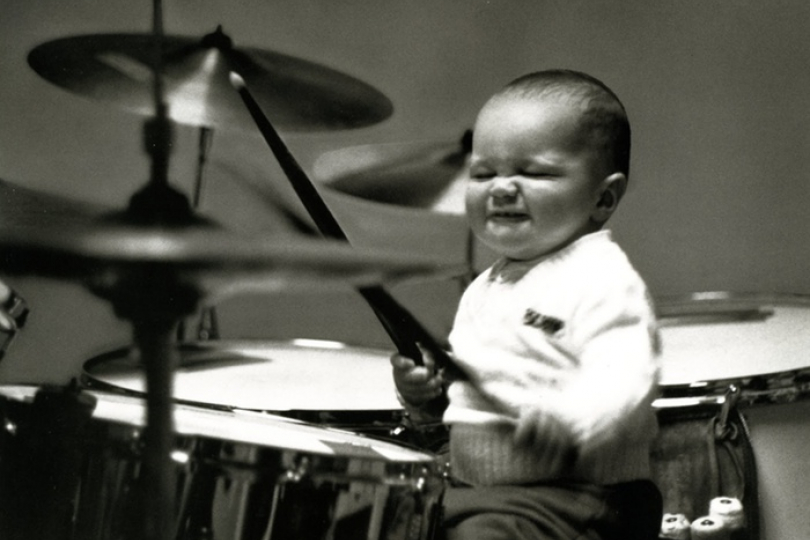
5+5 Reasons Why (Not) To Be a Drummer
Although many gleeful, even unflattering, allusions are made to drummers among musicians, and the drumming craft does indeed have its drawbacks, there are, on the other hand, many good reasons to play the instrument. So what are the main pros and cons of being a drummer? It's always better to end positively, so let's look at the cons first—that is, why not to be a drummer.
1. Desire alone to be a drummer is not enough
Not that learning to play the drums is more challenging than learning to play any other instrument, but mastering a drum kit and being a good and accurate drummer is a slightly more difficult task. Only a tiny percentage of the chosen ones can really tackle it with honour. The primary prerequisite is not only the ability to keep the rhythm but, to a large extent, also enough patience and a will to practice.
2. Perpetual difficulties in finding suitable rehearsal space
It goes without saying that a classic drum set can hardly be played in a tenement or apartment block. This can be solved by getting an electronic drum kit or using practice pads or nets instead of membranes. However, such a solution has certain pitfalls not only economically (quality electronic drums are pricey after all) but also considering the feeling of playing itself—it's a bit different from a full-size drum kit. In short, there is no substitute for a decent soundproof rehearsal room—and finding one can be a tough task.
3. Difficulties when travelling to gigs
Transporting drums to a gig on a tram or train may be a way to show off and have fun, but the transporter probably won't like you—and it's also relatively easy to lose the set or its part. The easiest solution is to buy a used car, but even here we can encounter various pitfalls, as even a relatively small drum kit is sometimes too big to fit into a passenger car— and accommodate a crew on top of it. Moreover, if the drummer is a bit of a megalomaniac, a band van may not solve the same problem either.
4. A lot of work before and after the gig
There is a well-known saying that the singer is the quickest to pack up after the act and all they have to do is "shut up" and put the microphone in their pocket (if they use their own one). However, it takes some effort and time to assemble and disassemble a drum kit. And unless you're a world-class drummer, there's usually no one to do it for you and you have to make do with your own strength and skill.
5. The duty to keep time for the band
Suppose a singer or guitarist gets "lost" when performing. In that case, it is usually not such a problem to disguise it so that the excited audience doesn't notice that something has happened. Not so with drummers. They simply can't afford to stop playing and wait until they can follow up again. Their task is precisely the opposite, and they are the ones who have to keep time for the band at all costs, and if for some reason they fail to do so, they have to be prepared to face criticism and abuse from the other members who are "surely not to blame". And that's a hell of a lot of responsibility and a strain on the nerves.
But enough negativity, let's get to the positive side of the drumming craft:
1. You will (almost) always be heard
In most cases, you are by far the loudest instrument in the band. And that itself is a good enough reason to take up drumming in the first place.
2. If you're an introvert, you can comfortably hide behind your instrument
Although it may seem unlikely, even drummers, often banging away on their drums like madmen, can be introverts in the back of their minds, who do not prefer to stand in the spotlight and are pretty happy to be hiding behind the drum wall.
3. You can be sitting while playing
Naturally, this privilege is shared by some of your fellow musicians (especially in classical music or jazz). Still, most of your fellow musicians have to be standing during the whole gig and perhaps even most of the rehearsals. The only exception is maybe the drummers involved in classical rock'n'roll, who from time to time can be seen not only behind the drums but often, in the heat of the game, standing right on them. In most other styles though, you can sit on a stool for the whole concert without being reproached.
4. You don't (usually) have to sing or speak to the audience
There are, of course, exceptions as singing drummers—and not only those who do backing vocals but also solo singing drummers—even though there aren't that many of them. Thus, playing drums kind of relieves you of the obligation to practice your voice and prepare the accompanying words between songs.
5. The sticks are great for throwing into the audience
Of course, guitarists and bassists can throw practically anything (for example, picks) among the fans, but with drumsticks, there is a high probability that one of the fans will catch them (and they will not be found by a cleaning lady after the gig, as sometimes happens with picks). Moreover, drumsticks fly quite well and can be aimed quite accurately (some drummers devote long hours of practice to this discipline) and therefore, with a bit of skill, it is possible to hit, figuratively speaking, your chosen female fan.
If you have found an error or typo in the article, please let us know by e-mail info@insounder.org.


